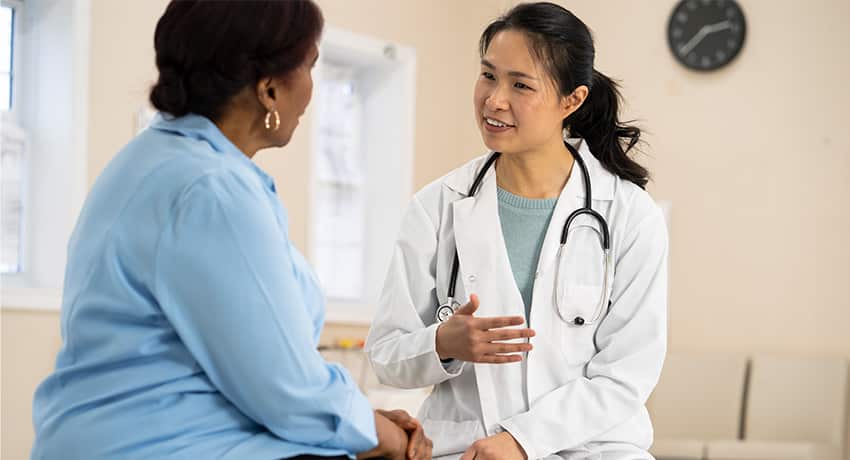- Colon and Rectal
- Signs and Symptoms of Gastrointestinal Disorders
Signs and Symptoms of Gastrointestinal Disorders
When to see a doctor
Since many gastrointestinal conditions overlap, an expert can help you determine what the cause and condition are. If you experience the following symptoms or have a family history of cancer, it is recommended to see a colon and rectal doctor to get evaluated.
- Abdominal pain or cramping
- Bloating
- Change in bowel habits
- Constipation
- Diarrhea
- Incomplete bowel movements
- Narrow stools
- Rectal bleeding or bloody stools
- Unexplained weight loss
- Weakness or fatigue
Gastrointestinal Diseases and Conditions
Comprehensive Care
UT Physicians is committed to provide the best quality care possible. We treat common and complex conditions using a full range of treatment options that fits your needs. The following are summaries of some common conditions. Please consult with your doctor if you experience any unusual symptoms.

- Colon and Rectal Cancer – Most colorectal cancers start as polyps in the inner lining of the colon and rectum. Over time, some polyps can change into cancer. Some grow into blood/lymph vessels and travel to distant parts of the body. Although adenocarcinomas comprise about 96% of colorectal cancers, other less common tumors can start in the colon and rectum areas too. These are carcinoid tumors, gastrointestinal stromal tumors (GISTS), lymphomas and sarcomas.
- Diverticular Disease – As Americans get older, pockets (called diverticula) develop in the colon wall. Diverticulitis is the inflammation/infection of these pockets. Routine examinations performed by a colon and rectal surgeon can distinguish this disease from other bowel diseases and an appropriate treatment plan can be implemented. Surgery is often recommended if there is little relief from chronic occurrences.
- Ulcerative Colitis – This disease can increase the risk for bowel cancer. Symptoms are often shared with other digestive conditions such as abdominal pain, bloating, bleeding or constipation. There are different options to confirm this diagnosis such as a sigmoidoscopic exam, a total colonoscopy, or a biopsy of the colon.
- Crohn’s Disease – This chronic inflammatory condition involves the intestinal tract and mostly affects young adults between the ages of 16 to 40. It is diagnosed through a physical examination and medical history review of symptoms and family. Medical treatment is often prescribed to control symptoms. Surgery usually offers long-term relief and may eliminate the need for medication.
- Irritable Bowel Syndrome (IBS) – This common intestinal muscle disorder often involves a combination of symptoms including constipation, diarrhea, stomach pain and bloating. Since IBS often resembles other serious of life-threatening conditions, it is recommended that you seek medical attention to rules these other disorder out.
- Hemorrhoids – Millions of Americans suffer from this common colorectal condition. External hemorrhoids develop near the anus while internal hemorrhoids develop within the anus near the lining. It is often caused by straining during bowel movements, pregnancy, chronic constipation and diarrhea, and genetics. Multiple treatments are available.
- Rectal Prolapse – This can occur when the rectum sticks out through the anus. It is common in older adults who have a long-term history of constipation/diarrhea, weak floor muscles. It can also be caused by nerve damage due to pregnancy, diabetes, cystic fibrosis and infections.
- Anal Abscesses – These are infected gland sites that are filled with pus. A colon and rectal surgeon can often drain the infected area.
- Anal Fistulas – These are abnormal connections between the rectum and surrounding skin. They rarely heal by themselves and usually causes itching and irritation. Most begin as abscesses. The most common treatment is a surgical procedure called an anal fistulotomy.
- Anal Fissures – These are small tears in the skin of the anus. They often cause pain and bleeding during bowel movements. The most common treatment is a procedure called a lateral internal sphincterotomy.
- Fecal/Anal Incontinence – This is the inability to control bowel movements. It can range from occasional stool leakage to complete loss of bowel control. Tests and treatment options range based on the severity of the condition.
Colorectal and Anal Cancer
Differences Between Colorectal and Anal Cancers
Colorectal cancer is cancer of the colon or rectum, depending on where the cancer starts. Colon and rectal cancers are often identified together since they share many similarities on symptoms, conditions and treatment options. It usually starts as polyps in the inner lining of the colon or rectum.
Anal cancer affects the anus, and usually starts at the inner lining in the glands and ducts of the anal canal.

Risk Factors
Higher risk factors doesn’t guarantee you will get cancer but it does increase the likelihood of getting cancer. When it comes to your risk, there are some factors you can change but some that you cannot. Education is the key to taking a proactive stance regarding your health and getting preventative/early screenings.
Colorectal cancer risk can increase based on factors such as obesity, physical inactivity, unbalanced diets, age, race, smoking and if you have a family history of cancer.
The risk for anal cancer can increase if you have conditions or diseases such as HIV infections, lowered immunity, smoking, gender, race, human papillomavirus (HPV) and sexual activity.
Signs and Symptoms
At early stages, colorectal and anal cancer patients often do not experience symptoms. If you experience the following symptoms, it is recommended to see a doctor. While it may not be related to colorectal or anal cancer directly, it may be tied to other conditions.
Symptoms of colorectal cancer include:
- Change in bowel habits
- Unexplained weight loss
- Rectal bleeding or bloody stools
- Weakness or fatigue
- Abdominal pain or cramping
- Incomplete bowel movements
Symptoms of anal cancer include:
- Rectal bleeding or itching
- Lump or mass at the anal opening
- Pain at the anal area
- Narrow stools
- Changes in bowel movements
- Abnormal discharge from the anus
- Swollen lymph nodes in the anal or groin areas


